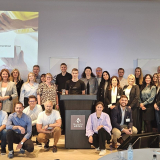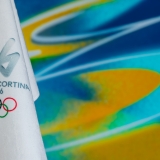
Selling Dreams: Lotteries’ marketing during and after COVID-19
As the world comes to terms with the ‘’new normal’’, lotteries over the past year have sought opportunities from the challenges presented during the biggest global health crisis in modern history. Lotteries have adapted their marketing strategies in innovative ways not only as a respond to operational challenges during the last year (lockdowns, partial or full POS closures) but also to react to the changing needs and behaviour of players as a result of living through a pandemic. The 2021 EL/WLA/NASPL Marketing Webinar took stock of the current situation, the lesson learnt from this global health crisis and how to navigate our way through the post COVID-19 period.
”The pandemic has no doubt had a huge impact on the lottery sector and on our lives as individuals. We must look at our own strategies to address the changing behaviour of our players. It is important to share our experiences but also discuss new ways to engage with the customers.”
Hansjörg Höltkemeier, EL President
”Marketing is at the foundation of benefiting society and players are at the heart of marketing efforts. Life will eventually return to normal, but the pandemic has altered parts of our lives forever and we should be ready to embrace this change. ”
Rebecca Paul Hargrove, WLA President
New consumer habits: A change in behaviour
During the pandemic it is clear that there has been a change in the behaviour and desires of players but also a change in behaviour in the way lotteries operate. Purpose driven marketing has become even more relevant with players seeking positivity, a community connection and more authenticity, and trust in campaigns. In many cases, social responsibility and sustainability are important elements for customers.
Lottery suppliers and industry partners IGT, Pollard Banknote and Scientific Games presented their views during the webinar and showcased examples on their internal sustainability programmes and for example, the use of FSC paper in their companies. IGT explored ‘’the great consumer shift’’ highlighting how the pandemic led to the exploration and use of new technologies – from contactless services to biometrics and facial recognition. Pollard Banknote looked at ‘’synchronising the consumer experience’’, outlining the importance of entertainment and social experiences for customers. Scientific Games focused on ‘’growth in a safe and sustainable way’’, with an emphasis on people, planet and prosperity are its three main business operation pillars.
In 2020 we understood the meaning of little things can make big things happened. Highlighted in the Keynote presentation by Shine Communication Sarl, players look more and more for brands and companies that are aligned with their own beliefs and personal goals. The idea of ‘’selling dreams’’ has became more poignant than ever for lotteries. By doing something small like buying a lottery ticket, players could dream big while at the same time supporting local communities and benefiting society, which was particularly important during a pandemic.
Becoming the norm: Innovative, agile, and resilient lottery marketing
Over the past year, living our personal and professional lives under national lockdowns, working, and socialising online have among other things become the norm. The pandemic seemed to end normal shopping decisions and lotteries therefore adapted the ways in which they offered games while at the same time safeguarding the health and safety of the players. For example, the Finnish National Lottery Veikkaus saw further digital transformations and the further growth of e-Instants. Online lottery sales increased, and many brands invested in contactless campaigns, for example with some technologies linking the license plate to the customer.
Uncertainty during the pandemic was something lotteries had to quickly learn to deal with. Being innovative and creative was vital to continue operations in an effective way to engage with customers. Examples were given from the Northern American Lotteries in Georgia, Indiana, Missouri and Quebec. Technological advances meant that lotteries were well equipped with the necessary tools to stay connected with customers. Fundamentally, lotteries have become more resilient, agile, and more open to discussing new ways to engage customers as a result of the pandemic. Many efficient and creative responses to the pandemic have already been put in place by lotteries to save and secure their businesses and this is set to continue in the future.
Benefiting society during a pandemic
Since the start of the pandemic, lotteries have been instrumental in supporting local communities – from offering relief and funding medical equipment to the creation of emergency funds and welfare aid, such as in Morocco with MDJS. This upholds national lotteries’ historic support and benefit to society in times of need. In addition, making sure players were safe and taking care of their physical and mental well-being while playing lottery games during a pandemic were important priorities for lotteries.
Several campaigns were presented during the webinar to highlight how lotteries adapted their marketing strategies to the pandemic and the positive approach they took. For example, a Mother’s Day campaign by Lotteries & Keno, Tabcorp in Australia helped customers buy their products via the channels that felt the most comfortable. In Israel the priority for national Lottery Mifal Hapais was a strong vaccination campaign. As there was a lot of scepticism the national lottery decided to have a special draw for vaccinated or recovered COVID patients, to encourage more people to get vaccinated to benefit society. Other campaigns focused on informing customers to stay safe in their home and educating senior citizens in Hong Kong for instance by the HKJC about digital applications to sustain their entertainment.
Lessons learnt from a global pandemic
One of the biggest learnings was the need to adapt fast to the changing environment – lockdowns, restrictions, closures of POS and to adapt to the needs of players and retailers, selling and buying games in a safe environment. Shows were cancelled or broadcast in a different format, and there was an increased push for solidarity and support of local activities.
The pandemic helped speed things up in terms of lottery innovation and creativity, acted as an opportunity to develop online digital channels, demonstrated courage to work in different ways and created feel good moments for the players. One example during the webinar was a campaign by Nederlandse Loterij to quickly sell tickets for the New Year’s Eve draw as the country entered yet another lockdown in December. Quick thinking and creativity lead to an all-time sales record.
Lotteries in the post COVID-19 period
Purpose has become an important component of competitiveness. It is clear that purpose driven marketing has benefited from the pandemic. Consumer habits and attitudes have changed. The pandemic has shown that customers seek positivity and authenticity in brands and marketing campaigns. Examples on learnings in Austria with young adults showed this clearly. Award winning campaigns of Norsk Tipping learnt the importance not always to focus on games but also on brand awareness. Lotteries have become more resourceful and resilience, quickly adapting their marketing campaigns to engage with players particularly in the digital sphere.
”The pandemic has created new opportunities and means to engage with new players. Lotteries have become more resilient and flexible in their approach. Upon all the presentation during the webinar, I am proud on the National Lotteries to be able to continue their games and do good for the benefit of Society under unprecedented circumstances. They have learned so much that they will take to the future. ”
Arjan van ‘t Veer, EL Secretary General
”We have become more agile as human beings and as an industry. We have also adapted our ways of working from a business and marketing perspective but also from a community spirit.”
Luca Esposito, WLA Executive Director






